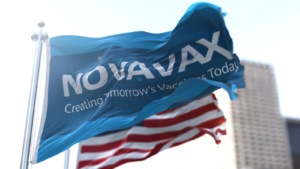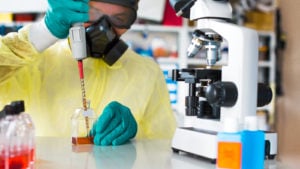Finding the best pharma stocks to sell can be an all-or-nothing kind of business.
If you score on a company making a breakthrough in a new drug or treatment, the rewards can be extreme, but investing in pharma stocks can also mean heavy expenditures on research and testing for a drug that may not perform as well as scientists hope.
Even if the drug does well, the extended regulatory process can be challenging for investors hoping for positive returns.
It takes some patience and a lot of know-how to invest successfully, including knowing which are the best pharma stocks to sell and when.
I used the Portfolio Grader to identify some pharma stocks to sell. If you’re holding any of these F-rated stocks, it’s time to dump them now.
| NVAX | Novavax | $9.16 |
| SGMO | Sangamo Therapeutics | $1.65 |
| ALLR | Allarity Therapeutics | $1.44 |
| VYNE | Vyne Therapeutics | $2.72 |
| HSDT | Helius Medical Technologies | $0.20 |
| CLOV | Clover Health Investments | $0.83 |
| NKTR | Nektar Therapeutics | $0.93 |
Novavax (NVAX)

Novavax (NASDAQ:NVAX) at one time was a fashionable bet on finding a Covid-19 vaccine, but things didn’t work out and investors wanted and now it tops the list of pharma stocks to sell.
While other companies sailed through their vaccines thanks to an expedited approval process in the U.S., Novavax couldn’t get its booster approved by the Food & Drug Administration until October 2022.
It’s also available in the European Union, Japan, Australia, New Zealand, Switzerland and Israel, but the U.S. authorization took longer, and that certainly dipped into Novavax’s profits.
NVAX stock is down 84% over the last year. It missed the window for rapid vaccine approval, and those profits went elsewhere. Now the company is publicly addressing the possibility that it could cease operations.
NVAX stock has an “F” rating in the Portfolio Grader.
Sangamo Therapeutics (SGMO)

Sangamo Therapeutics (NASDAQ:SGMO) is a struggling California pharmaceutical company specializing in gene therapy and gene editing.
How bad is it struggling? this is one of the top pharma stocks to sell, down 74% in the last year to fall into penny stock territory. It trades for roughly $1.64 per share and has a market capitalization of only $316 million.
Adding to investors’ nightmares is that Sangamo lost some key partnerships this year. Novartis AG (NYSE:NVS) terminated its collaboration and license agreement that included research on gene regulation therapies to treat neurodevelopment disorders. Novartis told Sangamo it’s ending the partnership effective June 11 following a strategic review.
Also, Biogen (NASDAQ:BIIB) also dropped its partnership with Sangamo that involved gene regulation therapies to treat neurodevelopment disorders.
The ending of both partnerships will hurt Sangamo’s bottom line because the company won’t be eligible to receive milestone payments from the companies down the road.
SGMO stock has an “F” rating in the Portfolio Grader.
Allarity Therapeutics (ALLR)

If you thought Sangamo was small, wait until you get a look at Allarity Therapeutics (NASDAQ:ALLR). The company, which develops oncology treatments for various cancers, has a market cap barely reaching $1 million.
And the stock is just over $1 per share, even after executing a 1-for-35 reverse stock split in March.
The problem for this company is a need for more cash. Allarity isn’t bringing in any revenue yet, but it spent $3 million in research and development costs in the last quarter it filed an earnings report – the third quarter of 2022, ending Sept. 30.
In that report, Allarity disclosed it lost $5 million for the quarter and had cash on hand of $3.9 million, down from $19.6 million at the start of 2022. It said it sought a bridge loan and expressed doubt that the company would have enough funding to continue in 2023.
That’s the last financial information Allarity issued, and the silence is troubling, at least. ALLR stock has an “F” rating in the Portfolio Grader.
Vyne Therapeutics (VYNE)

Vyne Therapeutics (NASDAQ:VYNE) is in better shape than Allarity, but not by much.
The company’s stock price is nearly $3 per share, but that’s only because Vyne also did that favorite accounting trick of struggling companies, the reverse stock split. For Vyne, the 1-to-18 reverse split happened in February.
The company, headquartered in New Jersey, attempts to develop treatments for patients with immune-inflammatory conditions.
Vyne is a long, long way from getting some serious revenue. Earnings for the fourth quarter included just $6,000 in revenue and a loss of nearly $10 million.
Yes, Vyne could one day bring one of these drugs to market. But it won’t happen soon, so the stock price has been down 72% over the last 12 months. VYNE stock has an “F” rating in the Portfolio Grader.
Helius Medical Technologies (HSDT)

Helius Medical Technologies (NASDAQ:HSDT) appears to be in legitimate jeopardy of falling prey to Nasdaq’s listing requirements of $1 per share.
Currently, Helius is only 20 cents per share, and it hasn’t seen the $1 mark since July 2022.
That’s why Helius announced plans to issue some Series B preferred stock (valued at $0.001 per share) as part of a strategy to push through a reverse stock split.
When it’s not doing financial maneuvers to inflate the stock price, Helius is working with non-implantable medical devices to help people with neurologic diseases regain their balance.
Unfortunately, that work isn’t very profitable. Helius reported revenue in the fourth quarter of $2022 to be $282,000 and full-year revenue in 2022 to be $787,000. The company recorded a net loss for the fourth quarter of $4.9 million and a full-year loss of $14.1 million.
HSDT stock is down 93% over the last year and has an “F” rating in the Portfolio Grader.
Clover Health Investments (CLOV)

Tennessee-based Clover Health Investments (NASDAQ:CLOV) sells Medicare Advantage plans to consumers.
Revenue for the fourth quarter of 2022 was $909.1 million, 145% better than a year ago. Earnings per share was a loss of 22 cents per share, but that was still better than the 24 cents per share analysts expected CLOV to lose.
Revenue is not the problem for this growing company. It’s the expenses are the problem.
Clover saw more than $300 million in losses over the last 12 months, and that cash is running out. Clover only had $332 million in cash at the end of 2022. It needs to figure out how to stem the bleeding before CLOV stock gets into serious trouble.
Investors are already wary. CLOV stock is down 72% in the last year and has an “F” rating in the Portfolio Grader.
Nektar Therapeutics (NKTR)

Nektar Therapeutics (NASDAQ:NKTR) is a biopharmaceutical company in San Francisco that works to create therapies that modulate the immune system to treat cancer and autoimmune disorders.
But it’s expensive work and, as we’ve discussed, sometimes all that expense doesn’t pay off. Last year, Nektar took a considerable blow when Bristol Myers Squibb (NYSE:BMY) pulled the plug on working with Nektar’s bempegaldesleukin as a possible renal cell carcinoma and bladder cancer treatment. That makes Netkar’s pipeline extremely thin.
It took another blow earlier this year when it released Phase 2 clinical trial data for its rezpegaldesleukin drug and how it would work on patients with moderately-to-severely active systemic lupus erythematosus (SLE). Unfortunately for Nektar, the trial failed to meet its primary endpoint, so the Phase 3 trial was called off.
That announcement sent NKTR stock down 39%. NKTR stock is now just over $1 per share and has dropped 83% over the last year.
Nektar also has an “F” rating in the Portfolio Grader.
On the date of publication, neither Louis Navellier nor the InvestorPlace Research Staff member primarily responsible for this article held (either directly or indirectly) any positions in the securities mentioned in this article.
